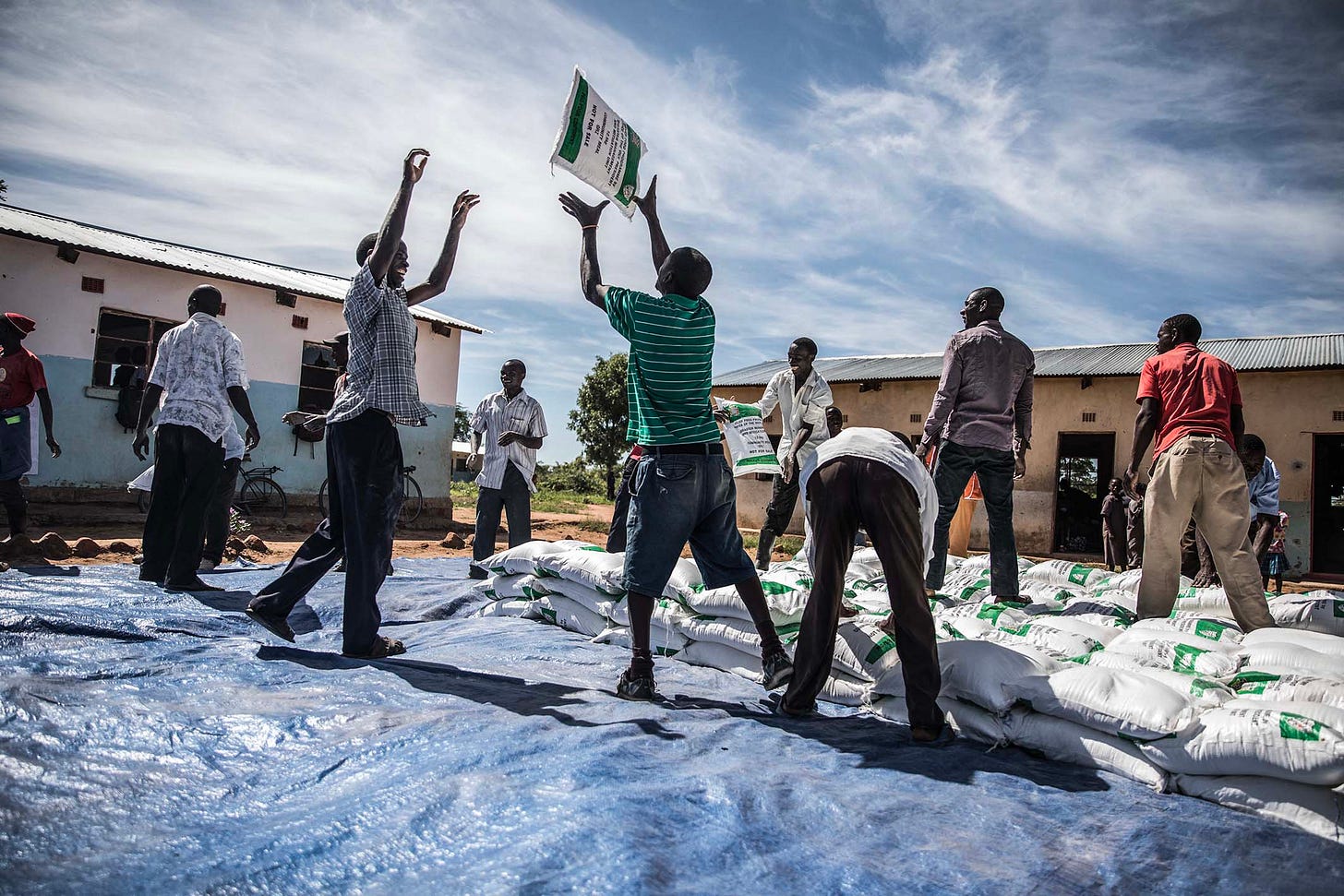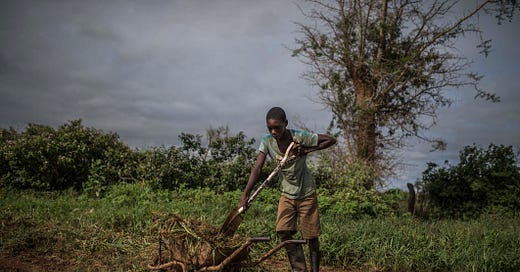Bill Gates, Big Agriculture and the fight for the future of Africa’s farmland
The Microsoft founder wields enormous influence over agriculture in Africa. He may be trying to end hunger, but critics say he is ‘playing god’ – and getting it wrong.
Africa has the fastest-growing population on the planet. There could be more than 2.4-billion people on this continent by 2050. That is a lot of mouths to feed. Feeding them all is the single greatest policy challenge facing African leaders.
The scale of the problem is daunting, given that we can’t even keep our existing population fed. Of the 1.5-billion people that live in Africa today, about 10% face severe food insecurity – that means they sometimes go entire days without eating a proper meal. Hundreds of millions more don’t always know where their next meal is coming from.
Now add another 900-million people into the mix. Something has to change.
The people tasked with figuring out what this change looks like are meeting next week in Kigali at the African Food Systems Forum. With the participation of the African Union, the forum will debate and then promote a 10-year plan to accelerate and transform African agriculture.
The premise is deceptively straightforward: to feed the people, you have to fix the farms – in particular, the continent’s 33-million smallholder farms. These farms currently grow 70% of Africa’s food – but do so with some of the lowest yields in the world.
But exactly how to fix those farms, while protecting the farming communities, is a matter of increasingly bitter debate.
The most influential figure in this debate is not an African farmer, or political leader, but a software engineer from the United States who has not worked a field in his life – although he does own quite a few: an estimated 270,000 acres across 19 US states.
The American dream
Bill Gates, the world’s seventh-richest person, is passionate about farming. He believes that modern industrial agricultural practices can solve world hunger. In the US, he has leveraged his fortune, estimated at $129-billion, to buy up so many fields that he is now that country’s biggest owner of farmland.
Farming in America looks very different to farming in Africa. The farms there are enormous: the size of an average US farm is 100 times bigger than its African equivalent. American farmers also tend to grow a single cash-crop, like corn or soybean, from geneticallymodified “hybrid” seeds. New seeds must be bought every year – because they cannot reproduce themselves – from massive industrial agriculture companies like Bayer and Syngenta, along with all the chemical fertilisers, herbicides and pesticides necessary for them to thrive.
All those inputs mean that it is an expensive model, and farmers need access to finance to make it work. But when it does work, it delivers: corn yields in the US are around 11 tonnes per hectare. In Kenya, the average is just 1.4 tonnes per hectare.
For Gates, the solution to hunger in Africa lies in bridging the gap between these two numbers. To feed more people, African farmers need to grow more food – and to do so, they must learn how to farm like their US counterparts. Farms must get bigger. African farmers need access to the latest hybrid seeds, and the capital to purchase them. Tired soil needs help from chemical fertilisers, crops need protection from bugs and disease, and harvests should be sold at market rather than stored for subsistence.
It sounds simple, but in practice this would be nothing short of a revolution in African agriculture, overturning centuries of traditional methods.
A revolution is exactly what Gates is proposing. In 2006, the Gates Foundation and the Rockefeller Foundation set up the Alliance for a Green Revolution in Africa (Agra), and between them have ploughed both national and continental agricultural policies. But the revolution has not gone according to plan.
A food system in collapse
Last month, the African Centre for Biodiversity released a report that sought to answer a question: Is Zambia’s food system collapsing? The country is suffering through one of its worst-ever droughts. Nearly half of maize under cultivation has been lost, while the price of this staple food has risen by 30%. More than six million Zambians, from a population of 20-million, are at risk of acute food shortages and malnutrition.
This was not part of Bill Gates’ vision. Successive Zambian administrations have been among the most enthusiastic adopters of the kinds of policies recommended by the Gates Foundation. The country is a poster-child for Agra’s drive to industrialise African agriculture, having implemented in 2009 a new subsidy programme to incentivise farmers to switch to commercial seeds and intensive fertiliser use. More than a million farmers did.
But, instead of increasing yields, the new approach simply increased farmers’ vulnerability to climate shocks like the current drought, the new report concludes. The use of hybrid seeds and imported fertilisers has degraded the soil, making it difficult to grow anything else; and the push to replace subsistence crops with cash crops, which then failed, means that farmers and their families are going hungry.
“We used to grow diverse crops,” said Mary Sakala, a Zambian farmer and chairperson of the Rural Women’s Assembly, which commissioned the report. “But now governments and agribusiness have pushed farmers into monoculture that depends on inputs. Their programmes have made us all vulnerable.”
It’s not just Zambia: broader continental studies have also cast doubt on the effectiveness of Agra’s policy proposals, including one commissioned by the Gates Foundation itself, along with Agra’s other funders. That study, released two years ago, found “Agra did not meet its headline goal of increased incomes and food security for 9-million smallholders.”
Another study, by Tufts University in the US, found no evidence in national level data of the 13 key countries targeted by Agra to suggest that its “green revolution policies had any meaningful positive impact on crop yields or food security. Despite objecting to its findings, Agra appears to have taken at least some note of its findings: it removed “Green Revolution” from its name in 2022, and is now known by its acronym alone.
‘Playing god’
“Bill Gates and big agribusinesses are playing god,” said Durban-based cleric Bishop Takalani Mufamadi. “They claim to be messiahs of the hungry and the poor, but they have failed dismally to deliver because of the industrialisation approach, which degrades soils, destroys biodiversity, and values corporate profit over people. It is immoral, sinful and unjust.”
Mufamadi was speaking on Wednesday on behalf of the Southern African Faith Communities’ Environment Institute, which called for the Gates Foundation to commit to “reparations” to repair the damage its agricultural policies have caused in Africa. Although he would not be drawn on a specific figure, he said that the foundation must work with the people who have been harmed to “repair the land and the water table”.

This call was echoed by the Alliance for Food Sovereignty in Africa, a civil society umbrella group that claims to represent more than 200-million smallholder farmers, pastoralists and indigenous peoples across the continent.
“The path they are leading us on is a kind of agriculture where we cannot farm without the use of agrichemicals,” said general coordinator Million Belay. This, he argues, leaves farmers vulnerable to extreme weather events and the fluctuating prices of inputs like fertilisers, which are usually imported.
Belay’s criticism goes a step further: he argues that the Gates Foundation has used its enormous political and monetary influence to crowd out alternative ideas. “I’m not saying that African governments have no agency, they do also have agency, but they are tied up with debt and other money challenges, which opens the door for the Gates Foundation and other big funders to come and influence our policies and strategies.”
When contacted by The Continent, the Gates Foundation rejected these critiques. “Our support of many organisations like Agra helps countries prioritise, co-ordinate, and effectively implement their national agricultural development strategies, based on country plans, to achieve this goal.”
Enock Chikava, the Gates Foundation’s director of agricultural delivery systems, went on: “We also believe that engaging in open dialogue with a diversity of African voices – including farmers themselves – is critical to our work and will continue to seek out constructive dialogues to address food and nutrition security around shared goals and the best ways to achieve them.”
For now, however, those dialogues will not include groups like Belay’s Association for Food Sovereignty in Africa, which will not be attending the big forum in Kigali next week – a forum where Agra plays a major role, with support from development partners like the Gates Foundation and industrial partners like Bayer and Syngenta.
This means that, once again, it is Bill Gates’ vision for the future of African agriculture that is likely to shape continental policy for the next decade – whether it works or not.







Africa's farming needs shouldn't be equated to the West's farming needs. What Africans needs are better farming techniques linking traditional and modern techniques to bolster food safety but whole replacing naturally produced seeds would endanger most farmers and families as most do not have access to funds to buy seeds every planting seasons. Globalism shouldn't subdue the local setups.
They want to expand AgriBusiness? And Bill Gates thinks it's a great idea? Why doesn't that surprise me.